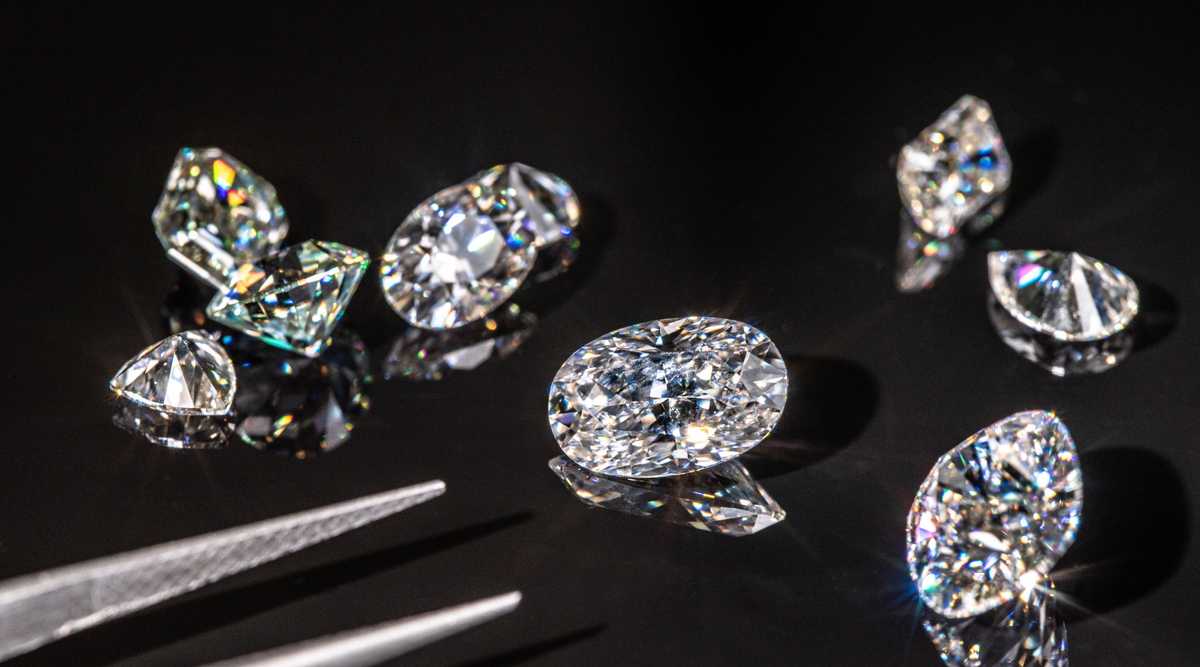

The cut grade of a diamond is the most important thing to consider when choosing a diamond. This is because the quality of the cut has a significant impact on the brilliance and beauty of the diamond. Choosing a diamond with a good cut grade will increase the overall beauty of the diamond and make it look well-balanced.
Today we will be taking a closer look at the "cut" which is one of the most important indicators of the 4Cs of diamonds .
table of contents
1. The history of diamond cuts
Diamond cuts have a long history and have evolved over time.
In the early days, diamonds were used in a shape close to their natural crystal shape. They were only recognized as sparkling stones that required cutting, but gradually they became more fascinated by people, and processing techniques evolved to show even more beautiful sparkle.
Then, in the early 20th century, the "brilliant cut" was introduced, a cut with 58 facets that reflects the most light and maximizes the brilliance of the diamond .
With the spread of the brilliant cut, it became clear that the cut has a significant impact on the brilliance and beauty of the diamond, and standards for measuring quality were established. Today, there are many different styles of diamond cuts, further expanding the appeal of diamonds.
2. How are diamonds cut?
Diamonds are known as the hardest mineral in the world. But do you know how such hard diamonds are cut?
In fact, diamonds have the same hardness and can only be cut by other diamonds. However, even though diamonds are as hard, they have some relatively weak bonding surfaces due to the nature of the crystal, and this property is called " cleavage ."
3. Diamond cut grades
The cut grade has a significant impact on the appearance and beauty of a diamond . The higher the grade, the more beautiful and shining the diamond will be, making it a very important factor in determining the price.
3.1 Differences in brilliance due to cut grade evaluation
Diamond cut is rated
- " Proportion " to evaluate the accuracy of the cut
- " Polish " evaluates the degree of polishing of the surface
- Symmetry: Evaluating the symmetry of the cut
It is judged based on these three.

As you can see from the photo, the quality of the cut can have a big impact on the brilliance of the same diamond. Cut grades are classified into the following five levels.
- Excellent
This is the highest grade and has an extremely excellent cut . It reflects light effectively and has an ideal sparkle. If your budget allows, we recommend choosing this grade.
Furthermore , if all three elements of proportion, polish, and symmetry are rated "Excellent," it is called "Triple Excellent (3EX)."
- Very Good
It has a relatively high rating and has better brilliance and reflectivity, making it an option for small diamonds.
- Good
A good cut. It does not have as much brilliance as Very Good or Excellent, but it is sometimes chosen as a cost-effective option.
- Fair
Generally not very shiny or reflective.
- Poor
The lowest rating. There is a significant lack of light reflection or brilliance. It is generally best to avoid this cut grade. A state of low aesthetic value.
3.2 What is Heart and Cupid?
Another symbol that is uniquely revered in Japan is the "Heart and Cupid."
The name comes from the silhouette of a heart and Cupid's arrow, which can be seen when looking at a round brilliant cut diamond with a special scope, as shown in the image below.

The heart and cupid can only be seen if the diamond is symmetrical.
As an indicator of cut, it is necessary to check whether the grade is "Excellent."
Because Hard and Cupid is not considered very important overseas , it is not trusted by international appraisal agencies such as GIA.
In Japan, heart and cupid diamonds are said to "capture the heart," and are particularly popular as engagement rings, so they are independently evaluated by the Central Gemological Institute.
4. Summary
The cut of a diamond is an important factor in determining its beauty and brilliance, and a good cut brings out the true value of the diamond. If you want something as beautiful as possible, we recommend choosing one with a high cut grade.
Also, if you want a larger, brighter diamond, you can get both "brightness" and "size" by choosing a lab-grown diamond. Lab-grown diamonds are evaluated with the same cut grade as diamonds. We recommend them as one of the options for the new era.

